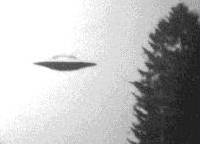Article/Document:
Apartment near University of Washington (Seattle) is a UFO clearinghouse
Associated Press, July 29, 2002
original source | fair use notice
Summary: News article on the National UFO Reporting Center, based in Seattle, WA.
By LUIS CABRERA
THE ASSOCIATED PRESS
In Freehold, N.J., a woman reports seeing an enormous craft "right out of ET" hover in the night sky for several minutes before it glided away over a wooded area.
A Michigan woman writes of being trailed in her car for two hours, from Kalamazoo to Muskegon, by a flying object covered in colored lights.
Near Yuma, Ariz., a group of boaters on the Colorado River reports seeing three bright, disc-shaped objects that are joined by two others before all streak off to the north.
Proof that we are not alone?
Almost certainly, says Peter Davenport, a former biotech executive and self-described "alien hunter" who has posted those and 1,124 other sightings this year on the Web site of the Seattle-based National UFO Reporting Center: www.ufocenter.com
"The evidence suggests to me that they are here on a daily basis," said Davenport, 54, who has run the 28-year-old center since 1994.
Davenport took over the center when its former director retired. Assisted by a handful of volunteers, he works "8 a.m. to midnight, seven days a week" from an office in his modest, two-bedroom apartment near the University of Washington.
Davenport acknowledges there's no smoking-gun proof that aliens are among us -- no seized flying saucers or unearthly skeletons on display. But he says evidence, from UFO sightings to investigations by fellow "UFOlogists" into reported close encounters, animal mutilations and possible alien artifacts, is mounting.
"I will not be surprised if, in the final analysis, we discover that we live in a galaxy that is teeming with intelligent life," and that much of that life has been racking up frequent flier miles to Earth, he said.
Whether or not Davenport is proved right, the center's Web site is clear proof of one thing -- thousands of ordinary people are interested in the subject.
"Actually, it's amazing to me how many people also have seen things or had (UFO) experiences in the past," said Susan Nelson, 46, a North Seattle homemaker and mother of two who said she never thought much about UFOs until she spotted one two years ago.
The UFO center doesn't usually disclose the names of spotters, but Nelson agreed to be interviewed. She said she was outside her home at about 10 p.m. on April 28, 2000, when she saw a "really large, bright, solid white object" race through the space between some trees.
After chewing over what she had seen for a few days, Nelson did an Internet search, found Davenport's site, and learned through him that others had seen the same object in Western Washington and British Columbia.
It was a relief, she said, to find she wasn't the only one.
The Internet has helped create a virtual community of UFO spotters, Davenport said. It also has led to a boom in reports for the center, since spotters can easily find it on the Web and no longer need to pay long-distance charges to make a hot line report.
However, some UFO skeptics are unimpressed by the high volume.
Barry Beyerstein, a brain researcher at Simon Fraser University in suburban Vancouver, B.C., believes that even those giving the most meticulous UFO descriptions are probably just fooling themselves.
"Perception is a very creative act," he said. "There's ample room for our brains to fill in more than is actually there."
Beyerstein, who is on the executive council of the highly skeptical Committee for Scientific Investigation of Claims for the Paranormal, noted some incidents cited by researchers where witnesses gave wildly inaccurate descriptions of hoax UFOs.
Other scientists are more open to extraterrestrial possibilities.
"I think there's some pretty good evidence that something is going on," said Bernard Haisch, an astronomer and director of the California Institute for Physics and Astrophysics in Palo Alto, south of San Francisco.
"I know most of my colleagues are pretty dismissive of the topic, but the more you learn about it, the less dismissive you can be," he said.
Haisch, who edits a leading astronomy journal and has published more than 100 scientific articles, has created a Web site aimed at presenting an objective look at UFO issues: www.ufoskeptic.org
Davenport's UFO Reporting Center posts its accounts in eyewitnesses' own words, including their often quirky grammar and spelling.
The site catalogs thousands of sightings, most from the last 10 years but dating to 1860, when circuit preacher William Killian wrote of a fireball passing low near Cherokee, N.C., sounding "like unto hot rocks thrown in to a barrel of water, which alarmed some of the females very much."
Davenport pays for most center operations, in part from the 1995 sale of his biotech firm, Panlabs International.
"I am flabbergasted that the world is devoting so little attention to the subject, given that some of the reported cases are so convincing," he said.
Read more articles on this topic:






